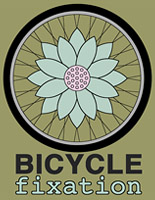[Previous entry: "Classic Wool Knickers Restocked"] [Next entry: "When Worlds Converge"]
09/28/2009: "Wheels and Places, Words and Faces...."
Are bars, cafés, and streetcorners the "routers" of our common humanity?Many tout the Web, with its burgeoning "social networking" sites, as a re-creator of our lost town squares. Many others, however, see that, rather than bringing us together, such affinity-based "virtual communities" tend to split us apart, into narrowly-focussed clusters of me-too-ists. They do not replace the random gatherings you find in what Ray Oldenburg called "third places," places that are neither home nor work.
Citiwire's Mary Newsome notes, in Where Everybody Knows Your Name, that people on the web tend to separate themselves into clans, but that in physical "third places," you meet people you don't agree with, as well as people you do agree with. Not only that, the customs of such places--be they eating or drinking houses or public squares--foster a civil exchange of ideas, and this leads to refinement of both ideas and the persons holding them; whereas "discourse" in Internet communities too often consists of mere agreement--and disagreement, all too often, of rudeness.
What's this got to do with bicycling?
Well, of course, the bicycle is a device that takes you somewhere; when you ride, you end up in a real place, as a real person, and in the company of other real persons. And the bicycle fosters a neutral affinity. All kinds of people love bikes, and all kinds who don't particularly love them still ride them and recognize their fellows in the craft.
Some of my cycling friends are radical anarchists, some are Goldwater Republicans, and there is everything in between. Sure, we email back and forth, post on blogs and Twitter, write solipsistic maunderings on our Facebook "walls"--but in the end, we get off our chairs and onto our bikes and go somewhere, places--"third places"--where we meet each other face-to-face, entering into a far richer experience than anything Facebook or its clones can offer.
And in those places we are not "avatars," but living, breathing human beings, with all the love and uncertainty we feel written on our faces.
We hail each other on the road, we buy each other beers or coffees when we meet, we talk, we ride together and engage the Earth in all its vigorous literality.
This is as much a value of the bicycle as its cleanliness, its efficiency, or the "simple pleasure" of riding it.
The car hides us--from others, from the Earth, from ourselves. The bicycle helps make our own lives real.
On this Yom Kippur, this "Day of Atonement," whose necessary word is derived from roots meaning a "at-one-ment," reconciliation as well as reparation, let's also remember our humble bicycles as instruments of real human congress amongst our often warring selves.
We also recommend you read Simon Baddeley's excellent article here, "Wire Wheels, Wired World", in Bicycle Fixation.



